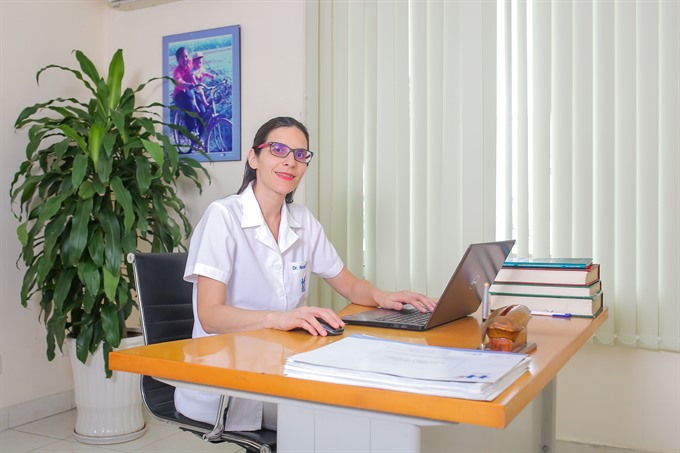 |
| Dr. Delphine Natali. — Photo courtesy of Hanoi French Hospital |
Viet Nam News
By Dr. Delphine Natali*
We are back in winter, from Christmas to Tet, we enjoy preparations and the festivities that come with this time of the year. But it is not all about having a great time and sharing good food with your loved ones, it is also the ideal weather to “catch a cold”.
Why is it so easy to catch a cold during winter?
When the weather is cold, we tend to sit in small, non-ventilated spaces together with our friends and family. In such an environment it is easy for air borne viruses to move from an infected to a healthy person.
Next our body has several mechanisms to adapt to the cold. One is that when breathing through the nose, water from the inner nasal lining (called the mucosa) is transferred to the inhaled breath to warm it before it reaches the lungs. This makes your nose dry out and the mucosa to be more susceptible to viruses in the air.
Especially in Ha Noi we are more exposed to air pollution during winter. Pollutants can irritate both your nasal mucosa and bronchi, again making it easier for viruses to penetrate and cause infection. That’s the same for smokers, because of the damage to your cells from cigarette smoke, smokers catch a cold more easily than non-smokers.
The cold and dark weather has more effects on us and on viruses. Unfortunately, it weakens our immune system and slows down the functioning of the cells that usually clear any particles or viruses that end up in our respiratory system.
But it also makes viruses stronger. Viruses do not like UV-sunlight, but they thrive in cold weather, which strengthens their protective capsule. This is why it is so much easier to catch a cold during the winter months.
What are typical respiratory diseases during winter and what causes them?
Winter associated respiratory diseases are mostly caused by viruses, but some forms may be caused by bacteria. A viral infection can be complicated by a bacterial supra-infection. It can also lead to worsening of other chronic conditions a person may suffer, such as asthma or certain heart conditions.
The most common respiratory diseases are:
- Common cold;
- Acute sinusitis;
- Tonsilitis;
- Flu;
- Acute bronchitis;
- Acute pneumonia
Let’s focus on the common cold
The most common respiratory disease, as the name already implies, is the common cold. Usually it is caused by a virus (over 200 viruses can cause this condition) and clears by itself after some days. Your typical symptoms are a sore throat, a stuffed, runny nose with clear, watery discharge, red eyes, sneezing, and sometimes coughing. You sometimes feel warm then cold, and very tired. This is usually not a serious condition and doesn’t require any specific tests or treatment.
As in all ailments you should rest, drink plenty of fluids to help your body clear the infection and eat plenty of fresh fruit and soups to replenish your body with needed vitamins and nutrients.
A tea made from ginger, lime and honey can sooth your throat and relieve irritation.
Make sure you keep your house well ventilated and avoid dry air. Air humidifiers or simply hanging your washed clothes to dry in the room when your rest can help humidify the air. If you are a smoker, stop smoking.
Paracetamol can help relieve fever and aches, and nasal decongestants, lozenges, cough syrup can help relieve other symptoms.
Antibiotics are rarely necessary to treat a bacterial supra-infection. Always seek the advice of your doctor if symptoms don’t get better after 3-4 days, or if you experience severe headache or localized pain, have shortness of breath or difficulty swallowing. If you have an underlying condition like asthma or heart disease, go see your doctor immediately to make sure you get the best treatment. Don’t take antibiotics without prescription by your doctor as they are not effective against viral infections, they are only indicated if you have a complication from an additional bacterial infection! — Hanoi French Hospital
*Dr Delphine Natali is a French-trained specialist in pneumology who recently joined our team. She works with Dr Hai Tran Pham at Hanoi French Hospital. Together they bring state of the art knowledge and treatment for all airway conditions, diseases and allergies.
If you have any questions or want to book an appointment with our doctors, please contact us at 84 – 24.3577.1100, or email us at contact@hfh.com.vn